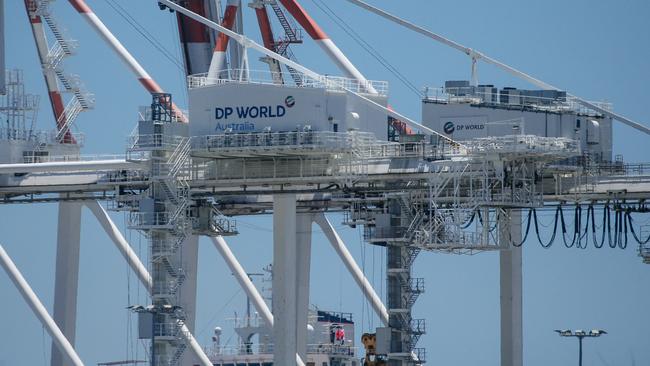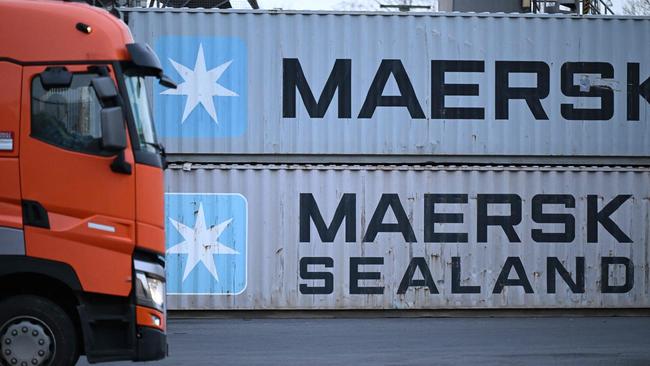Shippers warning of empty shelves in shops if ports dispute not resolved
As the government stays on the sidelines of the dispute between DP World and the MUA, businesses are warning of higher costs for consumers and stock shortages across the country.

Noticed any empty shelves at the shops lately? You soon might, as an industrial battle between the nation’s second biggest container port operator DP World and the Maritime Union of Australia leads to “chaotic” scenes at terminals and takes the supply chain to “breaking point”.
“I have a food client who supplies supermarkets who is getting hit from these strikes and they are running out of stock,” said freight forwarder Kelly Crossley, who owns Perth-based firm Transitainer WA.
As a result of the industrial action more than 50,000 containers are stranded, either getting in or out of Australia. DP World has estimated the delays have cost the nation $84m per day since it began in October last year and has asked the Albanese government to call in the Fair Work Commission for mandatory arbitration.
The dispute is over pay and rostering. Workplace Relations Minister Tony Burke has refused to call in the FWC to arbitrate and questioned DP World’s estimate of the true cost of the protected industrial action.
“It’s absolutely chaotic,” said Ms Crossley. “They’ve been striking since October, there is still no end in sight and there is a massive backlog of containers sitting around the terminals around Australia.”
In January about one-fifth of ships due to arrive from China cancelled their services due to the industrial action and Australian Retailers Association chief executive Paul Zahra has warned parents to watch out for “out of stock” labels on back-to-school items.
“It’s a nightmare,” said Ms Crossley. “Everyday Australians are not yet seeing the impact and understanding the ramifications of what this is doing to the economy, to importers, exporters. It’s crazy.”
Her fear is that the waterfront dispute, which she describes as the “worst I’ve ever seen”, will lead to the main shipping companies dramatically cutting back their Australian services.
“It costs hundreds of thousands to have vessels idling, even for a day, so the shipping lines eventually will get fed up,” said Ms Crossley. “The costs would go through the roof … it is dire straits.”

Indeed, one of the world’s biggest shipping lines, Maersk, said it was “currently experiencing significant impact” to its operations as a result of the industrial action, with average waiting times exceeding 10 days at DP World terminals on the Australian east coast.
“The Australian supply chain is at a breaking point,” said Maersk Oceania’s regional head of market, My Therese Blank. “The current situation with lengthy vessel waiting times is not sustainable and will have a devastating impact on cargo flows in and out of Australia unless we see an improvement in the next couple of weeks.”
The shipping giant has reduced the number of port calls in Australia as a result of the action, with some services now operating with fortnightly coverage instead of weekly. The average berthing for vessels is 10 days later than the schedule, which means it has to bypass some ports.
“We miss a full week’s vessel position, which effectively reduces the capacity available to accommodate imports and exports to and from Australia,” said Ms Blank.
One Maersk client, a paper and packaging company, told Ms Blank the disruptions at the ports has been “disastrous” to their supply chain as they could not move their product off Australia’s east coast, risking “out of stock” situations in one of their key markets.
One major Australian fashion company told Ms Blank of a “significant concern of loss of sale” due to the challenge of moving containers off the wharf, coming on top of an already challenging economic situation due to the tough outlook for the retail sector.
The small to medium enterprise market is being hit particularly hard, according to Angus Sedgwick, the CEO of trade financing company OptiPay, who has clients with stock worth hundreds of thousands of dollars now stuck on ships, unable to get into Australian ports.
As cost of living pressures mount, the pressure on these businesses through not being able to get stock they’ve paid for from countries such as China could challenge their survival.
Mr Sedgwick said a solar company client had put in a $US100,000 order from a supplier in Shanghai, and used OptiPay to provide short-term financing for the estimated four-week travel time from Shanghai to Port Botany.

Due to the DP World industrial action, that product was now eight weeks behind schedule, which was costing his client $21 per day in interest payments, with the additional risk his end client would cancel the order because of the delays and buy the product from another company, he said.
“He makes money when he sells the product, but he can’t invoice for the product until it’s arrived in Australia. These things add up to have a big impact on a SME’s cash flow,” said Mr Sedgwick.
“He’s done nothing wrong. He followed all the protocols, all the steps. It’s an industrial action outside of his control that may result in, maybe not bankruptcy, but a negative effect on his business. And that would be the same for tens of thousands of businesses in Australia,” Mr Sedgwick added.
The trade finance expert said the waterfront dispute would mean consumers could soon start seeing bare shelves.
“Across the whole economy there will be a knock-on effect even if you are not importing and distributing yourself,” he said. “Let’s say you’re a plumber and you can’t buy the product from Reece because they’ve run out, then you the plumber are affected too. The whole economy will be affected over a period of time if it’s not resolved in the next eight to 10 days.”
Mr Sedgwick said many companies had been holding extra stock pre-Christmas, “but that will run out if this is not resolved soon.”
The MUA and DP World are about to begin their third week of unofficial negotiations through the FWC and currently face a media blackout ordered by the commissioner.
Ms Crossley said that if the unofficial talks did not succeed, Mr Burke needed to call the FWC for the mandatory arbitration or risk empty shelves for customers, higher prices for imported goods and some small businesses hitting the wall because they couldn’t get their stock where it needed to go.
“You’ve got Tony Burke saying, well, we’ll let DP World and the unions sort it out themselves, but they’re not getting it sorted out. This has been going on since October,” Ms Crossley said. “It’s just got to stop.”







To join the conversation, please log in. Don't have an account? Register
Join the conversation, you are commenting as Logout